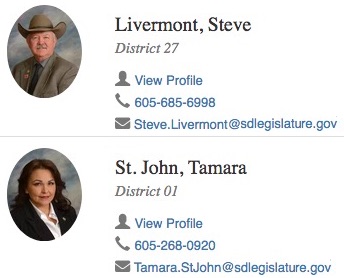With the South Dakota Water Management Board’s approval last week of TransCanada/TC Energy’s applications to use lots of water to build the Keystone XL pipeline, enacting laws to hold these foreign pipeliners accountable for any further damage they do to South Dakota is all the more urgent. To that end, members of the Legislature’s State-Tribal Relations committee offer House Bill 1093, which would require oil pipeliners to pay up to $100 million each year into a special fund to compensate local entities for expenses related to pipeline boo-boos.
Unlike Governor Kristi Noem, who has been rewriting her pro-pipeline anti-protest proposal behind closed doors, the State-Tribal Relations Committee worked on this bill publicly, so I’m able to look back at reporting from before Session and see that HB 1093 follows the committee’s working formula of charging pipeliners a quarter per mile per barrel of daily maximum capacity. In the case of Keystone XL, that’s $70,425,000 per year to cover claims local entities may make for oil spill cleanup. Keystone 1, TransCanada’s leaky East River pipeline, would be subject to another $23,925,000 per year. The annual fee for each pipeline (not each company, but each pipeline) is capped at $100,000,000. If nobody makes any claims on the cleanup fund in a given year, HB 1093 waives the fee on each pipeline until the next time the fund is accessed. That waiver clause is not pipeline-specific: it appears that, if one pipeline springs a leak, every pipeliner resumes paying into the fund.
Strangely, HB 1093 does not provide for individual landowners affected by pipeline spills to apply for compensation. HB 1093’s fund would be open to claims from the state or any “federally recognized Indian Tribe, political subdivision, private cooperative, or business entity.” Evidently individuals are expected to rely on TransCanada/TC Energy and their lawyers to secure any damages for TC’s mistakes.

All but two members of the State-Tribal Relations Committee are listed as sponsors of this responsible environmental regulation. The non-sponsors are noteworthy: Representative Steve Livermont (R-27/Martin) and Representative Tamara St. John (R-1/Sisseton) represent tribal communities in opposite corners of the state who have expressed sharp opposition to the hazards posed to water and land by TransCanada’s pipelines, and State-Tribal Relations is bringing HB 1093 at tribes’ request. Evidently Livermont and St. John prefer not to represent their voters’ opposition to Big Oil.
I don’t have a problem with this bill, although it is insufficient. As with most of these sorts of funds, it assumes spills and leaks will occur, and will be a problem. It assumes the costs incurred could be catastrophic to the budgets of local and state government and to some business interests. But it does nothing to address actual costs of leaks to human health, to surface and ground water, to flora and fauna. It doesn’t address standards for clean up. Does it include a rancher having to rent pasture as a result of a spill and the cost of transportation to move cattle? Does it include loss of productivity of the pasture for 40 years or more after the spill? Does it include things like the company paying rent for the residual spilled material that is not cleaned up? Does it include 40-100 years of testing for surface and ground water? I realize these things can be addressed in rules, but it is not clear in the bill.
They both appear to be sympathetic to Republican and Noem distortion of reality. It has become such a game to understand bias behind representative sitions.
Btw, similarly, NPR is so annoying using audio technology to speed up the language of interviewer/ee making it more unintelligible. Speaker and cell phone technology for convenience also interferes with clarity of broadcasts. (e.g. “On Point” impeachment trial interview with Cardozo law professor Kate _____ and less so of Professor Turley today. Earlier today Sam Harris interview re: chinese virus outbreak.)
Hear, hear Donald Pay. Every one of those observations (and surely more) needs to be addressed and codified.
Donald Pay—
Supposedly the cost of leaks & spills will be covered by the company, and by the paltry $15M bond in their PUC Permit. Not much we can do about that now, but we’ve tried.
On your point about covering costs to a farmer/rancher or other business owner or govt entity for disruption of business/service—yes—that is exactly what the bill is for. This is not a spill clean-up bill. This is a liability insurance bill.
Is it enough? Probably not. But let’s see if $100M gets through this legislature.
OK. Rebecca. I get it. Yeah, South Dakota regulators always underestimate the bond.
https://www.politico.com/news/magazine/2020/03/03/pipeline-safeguards-federal-parks-118941
We may get a clear idea how far the activist Scotus is willing to bend over for drumpf and energy companies violating National Parks and forests regulations. All bets are off.
Proper bonding requirements seems to be a far better answer. That also seems like the way to make companies take even more environmental caution in their work.
Is the current requirement based on costing out a clean-up effort, or was it more a number pulled out of the air?
West Texass Intermediate Crewd awl hit $11 bucks per barrel, down from $19 a week or so ago. Is KXL necessary and what happens to oil cleanup tax on rilly cheep oil?